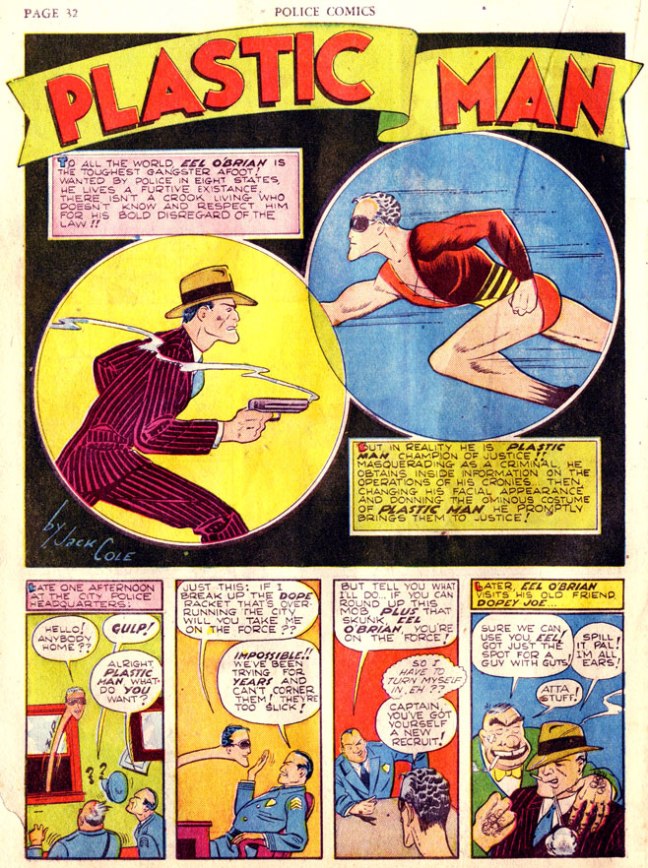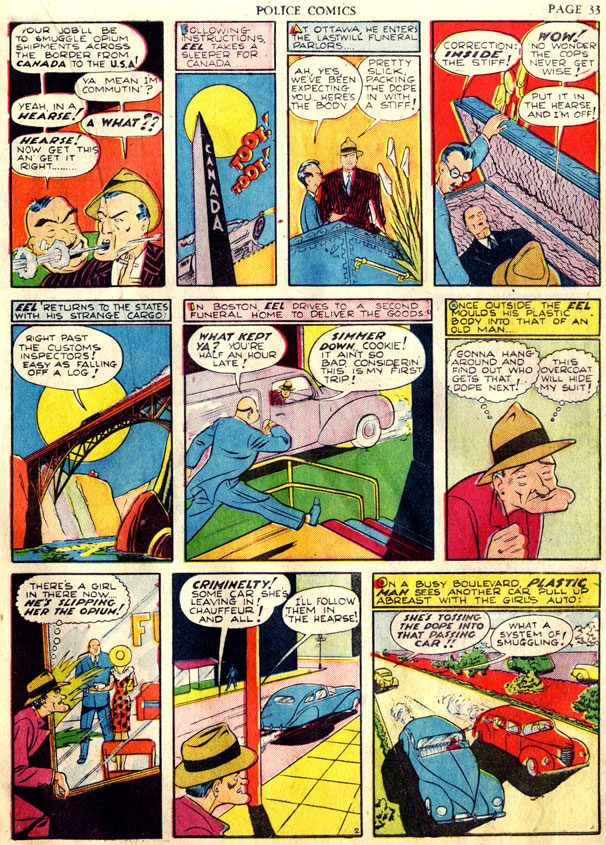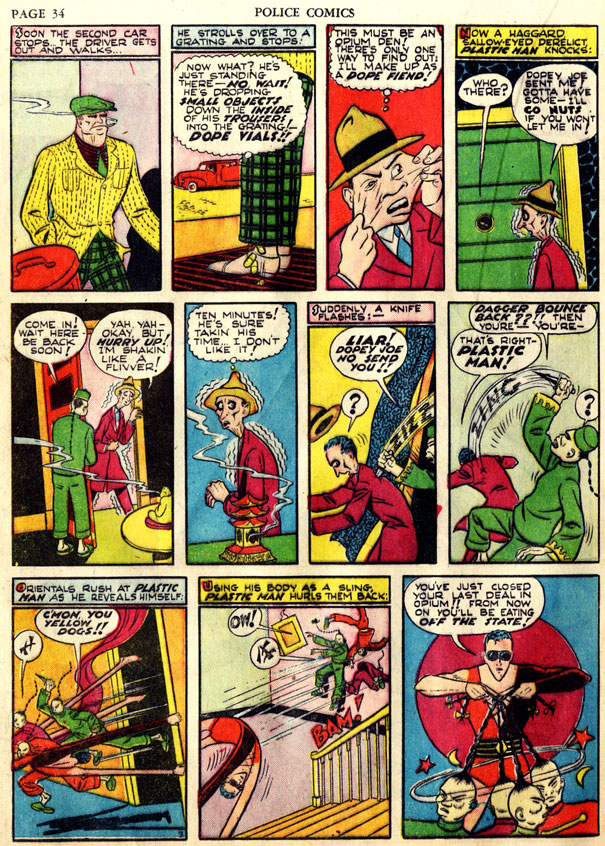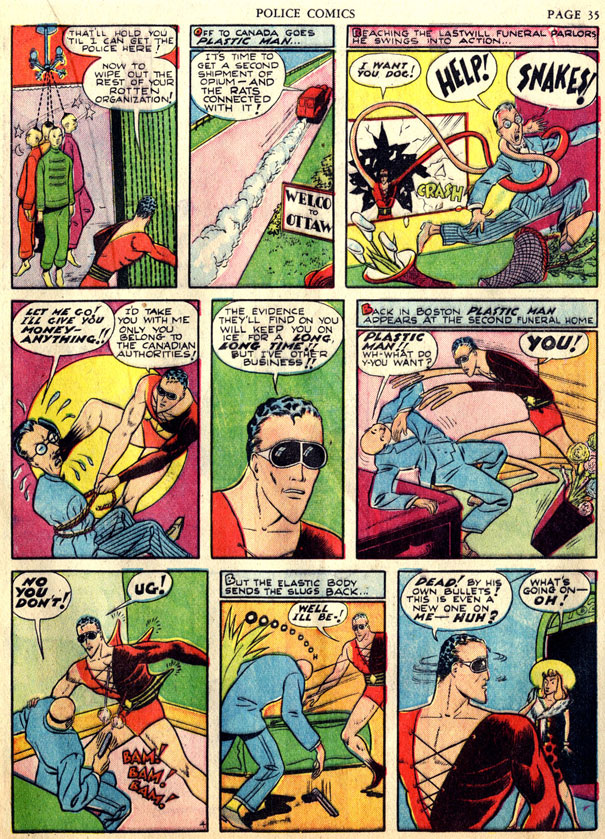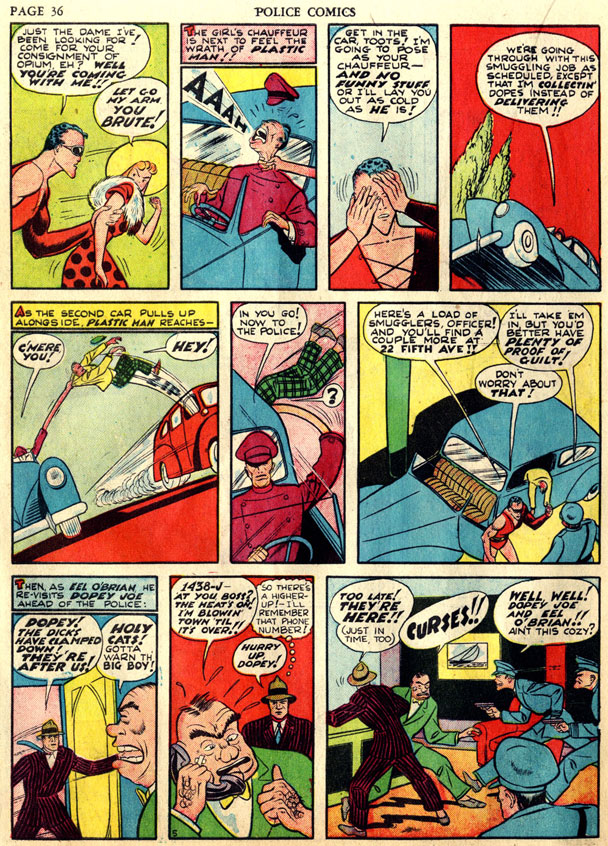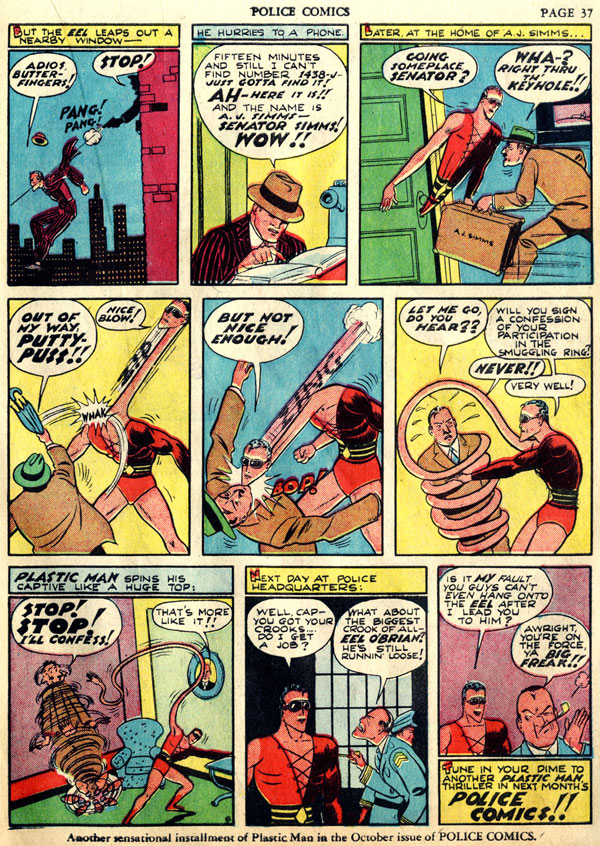Normally, these reviews of Plastic Man’s past appearances would consist of particular panels with a summary of details from the story to fill in the blanks, but in this case I’m giving you full pages from Police Comics #2 because, brother, there is a lot going on.
How Plastic Man joins the police! Opium! Canada! Casual racism! Bullets fly! Corruption at the highest levels! And all that in just six pages — I’m sure I’ll be saying this a lot, but there’s a ton of story in these relatively short features.
Our story picks up with Plastic Man visiting police headquarters, where he has a proposal for the chief: If Plas can break up the opium racket in town, he’ll be made a full member of the force. The chief calls his bluff, then raises the bet to one opium gang and that notorious gangster, Eel O’Brian. Whoops.
Back on the street as Eel, Plastic Man quickly hooks up with drug smuggler Dopey Joe. His old pal is happy to bring Eel in on the scam, and reveals the fairly gruesome way the smuggling ring is bringing opium in from Canada. It ain’t pretty, though Eel does get to drive a fancy car.
I love the way Jack Cole emphasized Plastic Man’s “man of a thousand faces” bit — it’s something that was lost with later iterations. Even more than the shapeshifting, I think it really shows Plas’ cleverness and ability to think on his feet. He’s no dummy.
After following the car and seeing a complicated, high-speed exchange go down, Plas follows one of the drivers and sees an equally complicated drop take place. Changing his face once again, Plastic Man pretends to be a dope addict and tries to shake his way into an opium den. Which, of course, is filled with awful caricatures of Asians.
I have to admit, seeing these kinds of images is always difficult for me — I feel embarrassed, uncomfortable and often a little pissed. But I also understand that when these sorts of things pop up in Golden Age comics, it’s almost always a matter of ignorance and insensitivity on the creator’s part rather than overt racism. I don’t like it, but I understand it in the context of who created it, and what society was like at the time. I certainly don’t believe Cole was a racist, and I like to believe that he never would have depicted people in this way if he’d been around in more modern times.
But the way Plastic Man rounds up the opium thugs … Christ, Jack.
There are a couple things I like about this page, though. I really dig the way Plastic Man seems to already be well-known to the criminal underground, and I like how comfortable Plas seems to be with his powers. Did the story jump forward in time a bit? It seems likely, but Cole did it in a way that felt natural and unobtrusive. And for the record, I had to look up the definition of “flivver,” but it makes total sense.
Next, Plastic Man zooms back to Ottawa, hot-bed of trans-border crime. He confronts the crooked funeral director, and we learn two things; Plastic Man’s base of operations is Boston, and he’s bulletproof! The funeral director learns that, too, but it doesn’t do him much good since he catches his own slugs on the rebound. By the way, you’ll be surprised to see how many times the bad guys will mistake Plas’ arms for snakes in later stories — not to mention how many times Plas will call criminals “dogs,” which I find weirdly endearing.
Ug! In short order Plastic Man snatches the fancy lady from the earlier drop, throttles a chauffeur, and sets Dopey up for a police raid while keeping his Eel O’Brian persona intact. He also manages to find out that there’s a boss above Dopey Joe, and gets his phone number to boot. That’s all in one page, guys.
In our final page, Plas tracks down the big boss and finds out he’s someone with plenty of power and influence. This doesn’t slow Plastic Man down a bit, though, and soon he’s slipping through keyholes, teaching a new meaning to the term “head-butt,” and setting bad guys spinning — literally.
And with the opium ring cracked, Plastic Man is welcomed onto the police force — even if he didn’t manage to bring in that slippery Eel O’Brian. THE END.
I really enjoy this story, for a number of reasons, but they all mainly come under the umbrella of characteristics and devices that would become classic Plastic Man tropes. The way Plastic Man is shown using his power is amazingly creative, with Plas going into action in a new way on almost every page. This really shows Cole’s unique imagination at work.
In particular, I like the snappy patter that runs throughout this story, from the sneering bad guys to Plastic Man’s own blend of rat-a-tat wiseguy lingo and righteous lawman pronouncements. And as I’ve said before, Plas is getting an obvious kick from busting criminals — he likes being a hero, and that is incredibly engaging. His affability, especially when he’s dealing with his former cohorts, is off the charts and makes him instantly likeable.
It’s not hard to see why Plas was such a success with readers right from the start; at the time, and for a long time after, there was nothing else on the stands quite like Plastic Man.
Police Comics #2 (Plastic Man): Jack Cole, writer/artist

